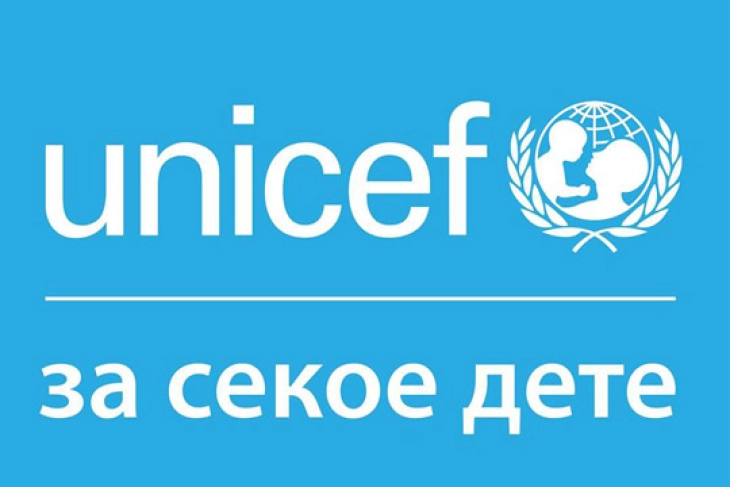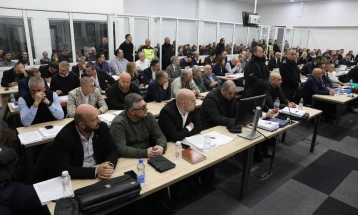UNICEF: 30 years for children in North Macedonia and we will never stop
- This year marks an important year for children in the country. This year the country celebrates 30 years since it ratified the Convention on the Rights of the Child. It also marks 30 years since UNICEF officially established cooperation after the country became an independent state.
- Post By Ivan Kolekevski
- 10:48, 31 July, 2023

Statement by UNICEF Representative Patrizia DiGiovanni on the situation of children 30 years after the country ratified the Convention of the Rights of the Child and established co-operation with UNICEF
Skopje, 31 July 2023 – This year marks an important year for children in the country. This year the country celebrates 30 years since it ratified the Convention on the Rights of the Child. It also marks 30 years since UNICEF officially established cooperation after the country became an independent state.
“While it is a year to reflect on the progress made for children, it’s also a time to reflect on the responsibility we have as a society to create the conditions so that every child in the country has a better childhood, fair chance, a better future and can reach their full potential.
“In 30 years, the country has made significant progress to advance the rights of the child. Legislative and policy frameworks to facilitate children’s access to their rights have improved. Fewer children are dying between birth and 5 years of age. More children are accessing primary and secondary education. There are no children placed in large-scale residential institutions.
“While progress is worth celebrating, we cannot look to the future without considering the backsliding following the COVID-19 pandemic, the energy and cost-of-living crisis and climate crisis. Furthermore, we cannot look forward without acknowledging that we live in a world of constant change and uncertainties. That there is still much to be done.
“These recent crises have shown us how fragile things can be when the foundations for resilience and human capital development are not in place. After 30 years, the situation calls us to be ever more committed to addressing the issues affecting children today.
“While less children are dying today than 30 years ago, the country still has high perinatal mortality rates compared to EU Member States and the South-East Europe Health Network members. Children are missing out on life saving vaccines due to misinformation. Furthermore, childhood obesity is becoming a growing concern putting generations at risk of lifelong physical and mental health problems in the future. We need an increase in investment to improve the quality and coverage of specialized maternal and child health services. We need evidence-based programs to reduce mortality from preventable causes, build awareness of the benefits of vaccines and to provide adequate information to the anti-vaccine movements. The country needs to strengthen breastfeeding and undertake campaigns to raise awareness of nutrition issues and proper eating practices.
“The efforts a country makes to protect its most vulnerable and children at risk is testament to its commitments to fulfil its obligations under the Convention of the Rights of the Child. After years of investing in the deinstitutionalisation reform, the country can be proud that it has been able to sustain having no child placed in large-scale residential institutions. While further efforts are needed to prevent child abandonment and expand foster care services, ensuring children grow up in a loving family environment is crucial for child wellbeing and development. The country should also be proud of having a strong legal framework to protect children from violence, abuse and neglect and to ensure all children have access to justice. There is an urgent need for investment in human, technical and financial resources to implement related national action plans and expand child protection services. With such high number of children who continue to experience violent discipline methods in the home, there is also an urgent need to strengthen parenting training programmes and promote non-violent upbringing strategies.
“Before COVID-19 the country was already facing a learning crisis with more than half of all fifteen-year-olds failing to meet basic proficiency levels in reading and math. The impact of the programmes to recover from learning losses remain unknown. And it is unclear how successful schools have been in reaching out to children who
dropped out of schools during COVID-19 school. We have seen a growing number of children who experience anxiety and fear, and need mental health support in schools. Furthermore, demographic changes without major adjustments to the primary school network, have resulted in inefficiency and inequities in the allocation of limited resources. An increase in public funding for and investment in education is a precondition for enhancing the quality and inclusiveness of education for all children. Curriculum reforms are needed that ensure children acquire the knowledge, skills, and abilities required for thriving in a modern society and the education system needs to get more from the investments. Children who were lagging behind in reading and maths before COVID-19 pandemic are now young adults, entering the higher education or the workforce. This will be the case for all cohorts until the situation is addressed. This is urgent. This is important. This will have severe repercussions on current and future generations.
“It is possible to ensure every child is thriving, learning, protected and participating, yet still Roma children, children with disabilities, children living in poverty are more likely to be left behind. The COVID-19 pandemic and rising inflation have driven additional children into risk-of-poverty. Furthermore, children experience poverty differently to adults and child wellbeing is determined by multiple factors, beyond family income. Deprivations in early childhood development, nutrition, education, safety, and love and care are among the top 5 contributors to multidimensional child poverty. Children with disabilities continue to face barriers to access mainstream education, and Roma children continue to face barriers to advance in education. These inequities keep them excluded and deprived of the opportunity to thrive and flourish like their peers. As we look to the future, we cannot do so without addressing equity and this needs to start by addressing multiple and intersectional discrimination against vulnerable children.
“As we live in an era of poly-crisis we cannot look to the future without considering the climate crisis and its impact on children today and the world tomorrow. Children are more vulnerable to air pollution than adults. Skopje and other cities in North Macedonia have frequently been cited as the most polluted in the world. We need to work for and with children and young people to drive efforts for improving environmental education and supporting youth led initiatives to address environmental degradation and climate change.
“The Committee on the Rights of the Child, in the most recent Concluding Observations of the country’s progress to ensure the realization of children’s rights in accordance with the Convention and its Optional Protocols, has raised several of these issues as matters requiring urgent action and have given clear specific recommendations.
“Creating a better future for every child, requires energy and commitment from everyone across society. North Macedonia’s aspirations to improve economic competitiveness and accelerate European Union integration are key to achieve a more secure, resilient, sustainable, and prosperous future for its citizens. Achieving these goals greatly depends on building a healthy, highly skilled workforce and developing human capital. Advancing the rights of every child is important for children today, but it is also the best way to build a more peaceful, prosperous, and just world for everyone.
“By celebrating our 30th anniversary in North Macedonia we are proud of our continuing commitment to children, women and families in the country. Whether in times of crisis or development, UNICEF has worked with partners to ensure every child has the best start in life, to be protected against vaccine preventable diseases, to feel loved and protected in a supportive family-like environment. To get ready for school and receive quality education in a violence-free, inclusive, and supportive school environment – everywhere and whatever the situation. To develop skills, curiosity, build self-confidence, express their opinion on matters that affect their life and grow into happy and resilient citizens.
“For UNICEF it never mattered who those children were or where they were from. What always mattered is reaching children at greatest risk and in greatest need. Now, together with our partners, UNICEF remains even more committed to continue to work for every child.
“Wherever they are. Whoever they are. Whenever they need us. And now, more than ever, we will never stop.”







